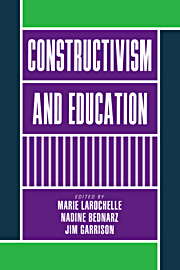Book contents
- Frontmatter
- Contents
- Preface
- List of contributors
- I Introduction
- II From epistemological constructivism to teaching: a variety of views
- III Teaching within the constructivist mode: practices and promises
- 5 Individual construction, mathematical acculturation, and the classroom community
- 6 The construction of answers to insoluble problems
- 7 Voice and perspective: hearing epistemological innovation in students' words
- 8 Constructivism-in-action: students examine their idea of science
- 9 Constructivism and ethical justification
- 10 Social studies, trivial constructivism, and the politics of social knowledge
- 11 Practical knowledge and school knowledge: a constructivist representation of education
- IV The mediating role of teachers and teacher education
- V Conclusion
- Notes
- References
- Index
8 - Constructivism-in-action: students examine their idea of science
Published online by Cambridge University Press: 04 August 2010
- Frontmatter
- Contents
- Preface
- List of contributors
- I Introduction
- II From epistemological constructivism to teaching: a variety of views
- III Teaching within the constructivist mode: practices and promises
- 5 Individual construction, mathematical acculturation, and the classroom community
- 6 The construction of answers to insoluble problems
- 7 Voice and perspective: hearing epistemological innovation in students' words
- 8 Constructivism-in-action: students examine their idea of science
- 9 Constructivism and ethical justification
- 10 Social studies, trivial constructivism, and the politics of social knowledge
- 11 Practical knowledge and school knowledge: a constructivist representation of education
- IV The mediating role of teachers and teacher education
- V Conclusion
- Notes
- References
- Index
Summary
Our ideas originate in the knowledge we had to start with. … You have to have had knowledge in order to have ideas and be able to observe.
A studentTo uphold, as this student has, that: (1) observation derives from the frame of knowledge a person has developed, and (2) in order to know, a person must already have some knowledge, may amount to adopting a constructivist point of view on the production of knowledge. We should, of course, guard against reaching hasty conclusions on the basis of a single statement which has been removed from its overall discursive context. It is worth noting here, however, that this assertion was but one of the conclusions reached by this student following personal reflection on the process involved in producing scientific knowledge.
It was thorny questions such as these which provided the basis of a series of exchanges Marie Larochelle and I undertook with a group of thirty-five students in the first year of Cégep, a Québec two-year tertiary institution; the starting point for the exercise consisted in the simulation of a number of conditions presiding over the production of scientific knowledge. Thus, it was not the discourse of accredited epistemologists which students were asked to reflect on, but rather the personal and collective cognitive processes which students themselves engage in when they attempt to solve bona fide puzzles. To borrow a metaphor, these students were called upon to engage in an in vivo, not an in vitro, type of epistemology, by means of a reflective, informed examination of their own epistemological framework.
- Type
- Chapter
- Information
- Constructivism and Education , pp. 121 - 138Publisher: Cambridge University PressPrint publication year: 1998
- 2
- Cited by

